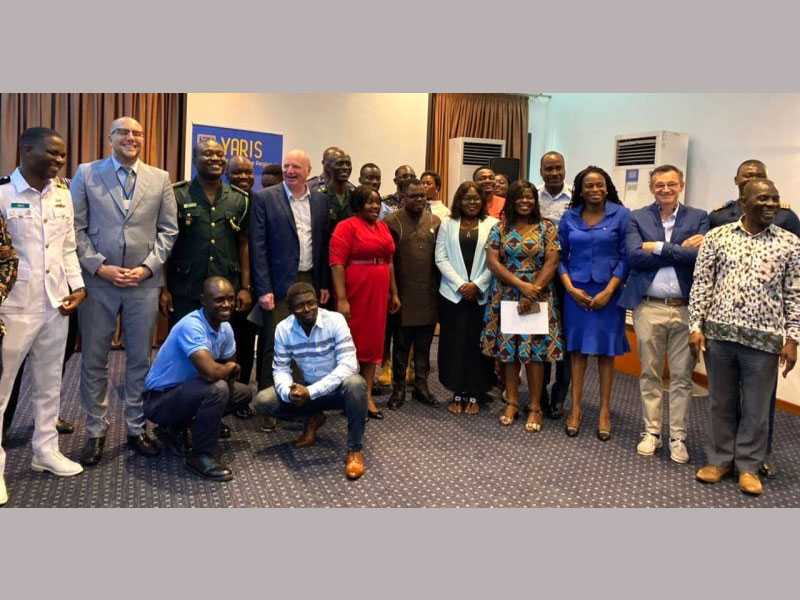3 min read
Yaounde Architecture reinforces fight against piracy
By: Business Ghana on July 25, 2022 at 9:00 AM

The fight against piracy and response to current maritime security challenges on the Gulf of Guinea have been reinforced with the utilization of the Yaounde Architecture Regional Information System (YARIS).
The YARIS platform, an information sharing tool or system for Maritime Law Enforcement Agencies in the Gulf of Guinea region, was developed in partnership with the Gulf of Guinea Inter-Regional Network (GoGIN ) project to aid the implementation of the Yaounde Architecture with the support of the European Union (EU).
The Yaounde Architecture comprises the inter-regional Coordination Centre (ICC), coordination and information-sharing structure which connects the Regional Maritime Security Centre for Central Africa (CRESMAC) and the Regional Maritime Security Centre for West Africa (CRESMAO).
The Coastal space is divided into five operational maritime zones -where activities are coordinated by five Maritime Multinational Coordination Centres (MMCC).
The YARIS platform is therefore an information sharing tool amongst the 27 maritime centres of the Yaounde Architecture, their partners and all stakeholders involved within 6,000 kilometres of the coast.
Operational since September 2020, the platform correctly connects 96 per cent of the Yaounde Architecture member states and centres.
Beyond inter-regional coordination, YARIS is also a tool for connecting national administrations and enforcement agencies.
Mr Daniel Appianin, Deputy Director-General of Operations, Ghana Maritime Authority, speaking at the closing of the national training and implementation of a National YARIS Network in Accra, commended the participants for their commitment and desire to develop and promote information sharing, leading to a secured Gulf of Guinea and to enhance legitimate use of Ghana’s maritime domain.
The stakeholders, numbering 29, underwent a 15-day training in the use of YARIS to master and maintain its functionalities, coordination and operations for combating piracy, illegal fishing, vessels in difficulty and miscellaneous trafficking.
The training enabled participants from Ghana’s maritime law enforcement agencies to utilize the platform to enhance surveillance and information sharing capabilities to improve maritime safety and security operations.
After the modular training, the operational centres will be connected to the national YARIS network, enabling them to facilitate the exchange of information and the coordination of operations at sea.
Mr Appianin said the country had experienced unprecedented levels of maritime insecurity activities in the Gulf of Guinea Region, including Ghanaian waters which had led to needless loss of lives, property and destruction to the maritime environment.
Conceived primarily as a maritime situational awareness tool, he said, the YARIS allowed knowledge on what was going on at sea and to coordinate crisis situation operation, incorporating email and videoconference services.
He noted that YARIS would therefore improve collaboration between coastal states to combat piracy and respond to current maritime security challenges that the coastal Gulf of Guinea State members were facing including drug and arm trafficking, illegal fishing, and environmental damages.
“The system further provides and facilitates real-time coordination of maritime operations at various levels and offers a wide range of complementary tools, such as the creation of dedicated situations, opening logs, chats, building views and use of smart layers,” Deputy Director-General of Operations explained.
Mr Pieter Smidt Van Gelder, Deputy Head of Delegation of the EU to Ghana, said the coordination of maritime safety and security was essential to monitor and combat any illegal activity at sea.
The European Union, he stated, had supported the implementation of the Yaoundé Code of Conduct signed in 2013 which placed information sharing at a strategic level with a network of maritime centres.
“In close relationship with ECOWAS and the Economic Community of Central African States, the EU has funded multiple actions and projects in the field of maritime security including capacity building and training modules carried out in Accra.
Mr Gilles Chehab, Head of Component – Capacity Building of the GoGIN Project, told the Ghana News Agency that the YARIS platform was a recognised tool by many national and regional and international agencies and external partners to link 24 Yaoundé Architecture Centres.
Squadron Leader Francis Tetteh, Pilot, Ghana Air Force, expressed optimism that with the knowledge imparted, it would offer participants the ability to detect and mitigate maritime crimes and threats in the country’s waters and the Sub-region.
Source: Business Ghana
Related Posts
Best Management Practice BMP5 Anti Piracy Measures
Best management practices 5 (BMP5) is the fifth version of a set of guidelines intended to deter..
Six countries adopt Yaoundé agreement on maritime..
Nigeria and five African countries have agreed to adopt the Yaoundé Code of Conduct (YCC) with a..
Bridge Watch: US Coast Guard Cybersecurity..
In this week's Bridge Watch, Corey Ranslem, CEO Dryad Global talks about the United States Coast..




